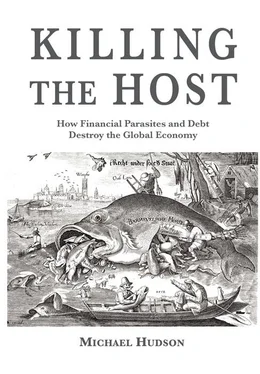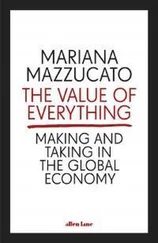To make matters worse, the hands of central banks in Europe and the United States are tied by the impression (sponsored by financial lobbyists) that governments should not run deficits but maintain surpluses that drain the economy’s circular flow and oblige it to rely on commercial banks and bondholders. Instead of public credit financing economic growth, bank debt is monetized in ways that benefit creditors at the expense of their host economies.
The Citigroup and AIG bailouts were financed with a stroke of the pen. Social Security, Medicare and other social spending likewise can be financed by the central bank creating money, just as it has created money to bail out Wall Street. Even worse, FICA wage withholding pays for these programs in advance, lending this forced saving to the U.S. Treasury so that taxes can be slashed further for the highest wealth brackets. The essence of Modern Monetary Theory is that governments can finance deficit spending electronically on its own computer keyboards just as commercial banks do. The difference between public money creation and bank credit is that the public purpose is to promote economic growth, not asset-price inflation. National prosperity requires spending money into the economy — for instance, for new capital infrastructure investment, health care and retirement pensions. Budget surpluses would oblige such spending to be privately financed — which means much higher prices for their services.
6. Pay Social Security and Medicare out of the general budget
In 1983 the Commission on Social Security Reform chaired by Alan Greenspan recommended that instead of treating Social Security and Medicare as public programs funded out of the overall budget, they should be privatized into a savings program paid for mainly by the least affluent members of society, by steadily raising the FICA payroll tax. These wage withholding taxes are now over 15 percent (including the employer’s 6.2 percent share of Social Security levies). They do not fall on high-income earners!
This regressive tax shift away the higher income brackets functions as a fiscal class war. It has cost wage earners hundreds of billions of dollars. The government has raised user-fee taxes on wage earners — up to a low cut-off point freeing earners of more than $120,000 from having to contribute. No such user fees are imposed on banks for their $4 trillion in Federal Reserve Quantitative Easing credit, the $800 billion TARP bailout and other subsidies.
Any politician who fails to explain that it is regressive income taxation to subsidize the One Percent in this way — but not Social Security — can be assumed to be in Wall Street’s pocket or the proverbial “useful idiot.” The effect of self-funding social spending is to impose austerity on the 99 Percent, “freeing” the One Percent from fiscal responsibility.
7. Keep natural monopolies in the public domain to prevent rent extraction
Financial lobbyists condemn public spending as deadweight, even for roads, the post office and other basic infrastructure. They claim that privatization will provide these services at lower prices than government can match. Yet all the evidence points to the contrary. This is largely because in today’s world, privatization involves financialization, adding charges for interest, dividends and exorbitant salaries to managers to the break-even prices that must be charged — not to mention using profits or rents for stock buybacks to create capital gains for managers and owners.
Over and above these costs, privatizers charge as high a price as the market will bear. This margin is monopoly rent. It was to prevent this price gouging that vital infrastructure traditionally was kept in the public domain. Since antiquity, roads and transportation, canals and civic buildings have been so expensive that private ownership would have exacerbated wealth inequality and created monopolistic elites. Even medieval serfs at least had access rights to the commons to help provide for their livelihood.
Monopolies were privatized more in the United States than in Europe during the Progressive Era, so U.S. techniques of price regulation for electric utilities and railroads was more developed than elsewhere. Price gouging was analyzed as an excess of market price over carefully defined intrinsic and necessary cost-value. But Europe kept basic infrastructure in the public domain, so there was less of a regulatory tradition for the sectors privatized after 1980. And no such tradition existed when the Soviet Union’s republics became independent in 1991. Their rent-extracting “grabitization” was more extreme than anywhere else in the world.
Today’s New Enclosure movement is privatizing public infrastructure. These giveaways of the modern-day commons are attracting new buyers, who borrow to buy these monopoly privileges — and pay banks interest out of the prices they charge. Privatization provides banks with a loan market capitalizing rent extraction rights into bonds, stocks and bank loans. The Thatcher-Blair model for Public/Private Partnerships typifies this giveaway of public assets. (Chicago’s financialization of its sidewalk parking meters is a notorious U.S. example.) This underwriting gave banks a strong motive to drive government out of the business of providing public services or of regulating and taxing rent-yielding enterprises.
Short of de-privatizing (that is, re-nationalizing) land, natural resources and monopolies to the public domain, the remedy is a rent tax, backed by a tax on excess profits and unexplained enrichment.
8. Tax capital gains at the same progressive rates as earned income
Some 80 percent of capital gains are in real estate, reflecting its dominant size in the economy. As in the stock and bond markets, most such gains do not reflect tangible capital investment, but result mainly from banks lending more as they loosen credit standards, e.g ., for junk mortgage lending in 2001-08. Real estate prices rise when central banks lower the interest rate at which profits and rents are capitalized into bank loans.
The freer the lunch, the more pressure is brought on governments to make rentier gains even larger, by taxing them even less. Real estate gains are not taxed if they are reinvested in new property, or if nominal ownership is located in tax havens (or when owners die). Wall Street traders enjoy a similar “loophole” that taxes their financial winnings at a low capital-gains rate.
The remedy is to tax asset-price gains at least as high as the maximum income tax rate. Otherwise, the economy will favor such gains over those from tangible investment.
9. Deter irresponsible lending with a Fraudulent Conveyance or Odious Debt rule
The most obvious way to deter over-lending would be to make lenders bear the cost of loans gone bad. Loans made without a reasonable analysis to ascertain that they can be repaid in the normal course of business would be deemed to have been made fraudulently. Companies defending themselves against raiders in the 1980s cited the fraudulent conveyance principle to claim that the junk bonds and bank loans financing the buyouts could only be paid by carving up the company, downgrading its pension plan or closing down its long-term investment. For public debt, the guiding principle should be that bondholders should lose if the only way they can be paid is by imposing austerity, unemployment and forced emigration or sell offing the public domain. No nation should be compelled to pay creditors before meeting its own economic survival needs.
As Greece’s debt negotiations were coming to a head, the Parliamentary “Debt Truth” Committee stated the problem on June 17, 2015: “People’s dignity is worth more than illegal, illegitimate, odious and unsustainable debt.” The demands by the Troika were found to be “aimed exclusively at shifting private debt onto the public sector.” The report describes how this asset stripping combined with demands for austerity was the legacy of the Troika’s “bailout” of Greece that only helped private bondholders, not the Greek economy:
Читать дальше












